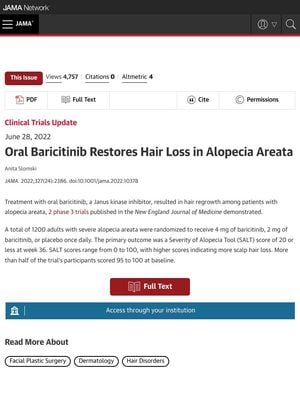TLDR Baricitinib, a medication taken by mouth, was effective in regrowing hair for people with severe hair loss.
Two phase 3 trials involving 1200 adults with severe alopecia areata demonstrated that treatment with oral baricitinib, a Janus kinase inhibitor, resulted in hair regrowth. Participants were randomized to receive either 4 mg of baricitinib, 2 mg of baricitinib, or a placebo once daily. The primary outcome was a Severity of Alopecia Tool (SALT) score of 20 or less at week 36, with SALT scores ranging from 0 to 100, and higher scores indicating more scalp hair loss. Over half of the participants had initial SALT scores between 95 to 100.
 July 2023 in “IntechOpen eBooks”
July 2023 in “IntechOpen eBooks” New treatments for alopecia areata show promise, but more research is needed to confirm their effectiveness.
 1 citations
,
October 2020 in “Journal of Cosmetic Dermatology”
1 citations
,
October 2020 in “Journal of Cosmetic Dermatology” Using minoxidil and tofacitinib together can effectively treat severe hair loss.
1 citations
,
March 2017 in “PubMed” Topical minoxidil did not significantly regrow hair in alopecia areata patients after 3 months.
May 2011 in “Harper's Textbook of Pediatric Dermatology” Alopecia areata causes patchy hair loss and has no cure, but treatments like corticosteroids and minoxidil can help.
 2 citations
,
February 2009 in “Journal of Evidence-Based Medicine”
2 citations
,
February 2009 in “Journal of Evidence-Based Medicine” No treatment showed significant long-term hair growth benefits for alopecia areata.
 24 citations
,
February 1987 in “Drugs”
24 citations
,
February 1987 in “Drugs” Minoxidil promotes hair regrowth, but more research needed for effectiveness and response factors.
 80 citations
,
October 1983 in “BMJ”
80 citations
,
October 1983 in “BMJ” Minoxidil helps hair regrowth in alopecia patients, with 16 having good results and no side effects.






